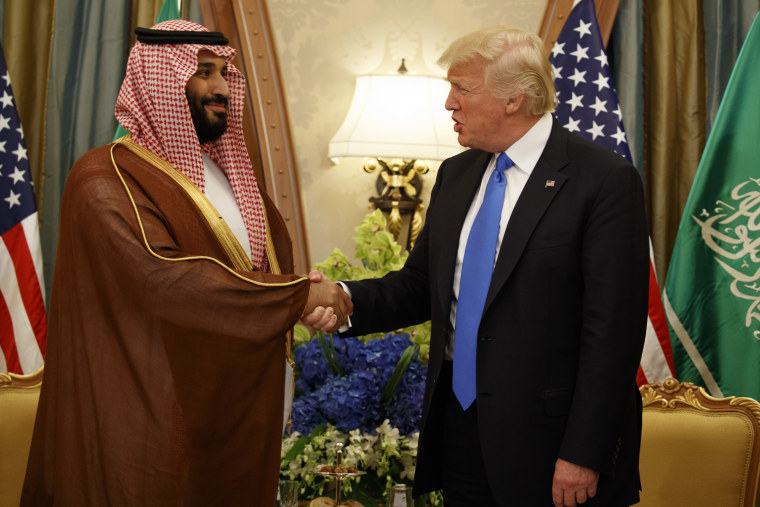The New York Times did a nice job over the weekend summarizing the "strange dynamic" between Donald Trump and Saudi Arabia, especially in the wake of Friday's deadly shooting in north Florida.
When a Saudi Air Force officer opened fire on his classmates at a naval base in Pensacola, Fla., on Friday, he killed three, wounded eight and exposed anew the strange dynamic between President Trump and the Saudi leadership: The president's first instinct was to tamp down any suggestion that the Saudi government needed to be held to account.
It started with tweets, in which the American president let everyone know about King Salman calling him to "express his sincere condolences and give his sympathies to the families and friends of the warriors who were killed and wounded in the attack." Trump, echoing the king's message, added that the Saudi people "are greatly angered by the barbaric actions of the shooter, and that this person in no way shape or form represents the feelings of the Saudi people who love the American people."
A day later, the Republican told reporters, "They are devastated in Saudi Arabia." Trump went on to say that King Salman "will be involved in taking care of families and loved ones. He feels very strongly. He's very, very devastated by what happened and what took place. Likewise, the Crown Prince. They are devastated by what took place in Pensacola. And I think they're going to help out the families very greatly."
It prompted MSNBC's Andrea Mitchell to note, "Accepting the Saudi King's apology without demanding they investigate is shocking. No demand for accountability."
Complicating matters, it wasn't just Trump. Secretary of State Mike Pompeo also echoed Saudi Arabia's "condolences and sadness," while Defense Secretary Mark Esper downplayed reports that a Saudi soldier filmed the shooting at the American military base.
Sen. Chris Murphy (D-Conn.) noted soon after, "It's unnerving how eager everyone in this administration is to be PR agents for the Saudis. I'm glad they are sad and cooperative, but ask yourself: would this administration do this for any other country besides Saudi Arabia?"
That need not be a rhetorical question.
The aforementioned New York Times report added, "What was missing was any assurance that the Saudis would aid in the investigation, help identify the suspect's motives, or answer the many questions about the vetting process for a coveted slot at one of the country's premier schools for training allied officers. Or, more broadly, why the United States continues to train members of the Saudi military even as that same military faces credible accusations of repeated human rights abuses in Yemen, including the dropping of munitions that maximize civilian casualties."
In case anyone's forgotten, Trump took the opposite posture in 2016, suggesting he was eager to get tough in Riyadh, and insisting he wouldn't be as solicitous of Saudi Arabia as some in D.C.
That was then; this is now. Trump's obsequiousness toward the Saudis has become an unnerving staple of his presidency.
It's hard not to wonder whether the president's financial ties to the country have anything to do with his unfortunate foreign policy.
